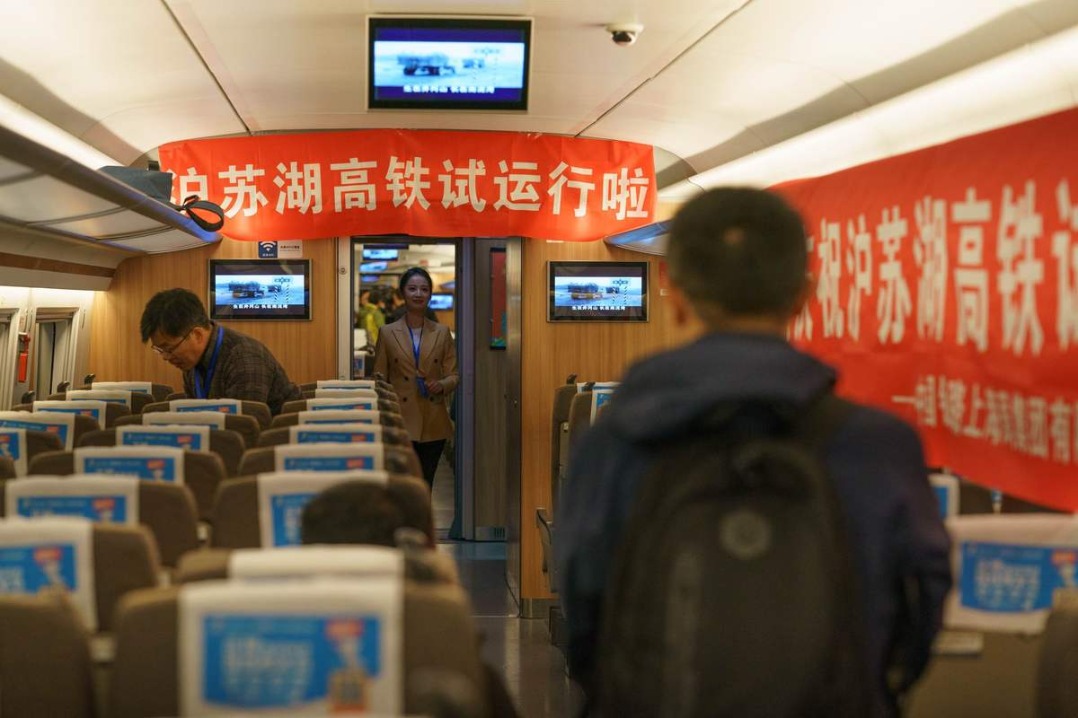Record broken: China's parcel network reaches unprecedented heights

At 10:40 am on Tuesday, in Chongqing, a small but significant moment unfolded as 32-year-old Mu, a local resident, received a parcel at her doorstep—a box of apples from Tianshui, Gansu province. This simple act of receiving a package marked the 150 billionth parcel delivered in China this year, underscoring the enormous scale of the country's parcel delivery industry and its growing role in the nation's economy.
"I order all kinds of things online—from clothes to food, and even fruit," Mu said as she unpacked the apples, which were fresh, unblemished, and perfectly sweet.
"It's incredible how quickly everything arrives. Just two days ago, I ordered these apples, and now they're here. It's so convenient, and the quality is guaranteed. I can't imagine life without this service."
A Record-Breaking Milestone
What might seem like an ordinary online purchase was, in fact, a landmark achievement for China's booming parcel delivery sector. The 150 billionth parcel of 2024 was part of a larger trend that has seen parcel volume surge at an unprecedented rate. To put it into perspective: if all of this year's parcels were laid end to end, they would circle the Earth and reach the Moon—not once, but 50 times.
The milestone highlights not just the sheer scale of the sector but also its vital role in driving the country's economy. By 2024, the average Chinese consumer receives more than 100 parcels annually, and the nation's delivery network handles more than 5,400 parcels every second.
Speed, Quality, and Affordability
Mu's experience mirrors the broader national trend. As more people across China embrace online shopping, the efficiency of parcel deliveries has become a hallmark of daily life. From food deliveries to fashion and electronics, Chinese consumers increasingly expect fast, reliable service—and the country's parcel sector has more than risen to the occasion.
For Mu, convenience is a key factor.
"Everything I buy is online, and the prices are always better than in the store. The speed of delivery is amazing. I can order something in the morning and have it delivered by the afternoon," she said.
"It's also cheaper than going out to buy it in a store."
This year, the logistics industry in China has reached new heights, with daily business volumes exceeding 7.29 million parcels on the peak day. But it's not just about the volume. The quality of service and affordable prices have made parcel delivery a routine part of life. The rapid delivery times and competitive pricing make online shopping even more appealing to millions of people like Mu, further driving the growth of the e-commerce sector.
A Growing Role for Rural and Western China
What makes the milestone even more remarkable is that China's parcel delivery network is not confined to major cities but also extends to rural areas.
For years, regions in some central and western areas of China faced significant challenges in accessing goods. However, this has been changing rapidly, with companies like J&T Express and e-commerce giants like Pinduoduo pushing to expand the logistics network into underserved areas.
The box of apples Mu received came from Gansu, a province that has seen dramatic improvements in its logistics infrastructure. Just a few years ago, Gansu's farmers struggled to sell their products due to a lack of e-commerce channels. Now, Pinduoduo, one of China's largest e-commerce platforms, and local delivery companies are enabling farmers in Gansu and other provinces to reach consumers across the country.
Zhang Pengfei, a local entrepreneur in Gansu, helped bridge the gap by launching an online shop selling local agricultural products. He and his team now help Gansu farmers sell thousands of apples a day through online platforms.
"The rapid growth of e-commerce and logistics here has been a game changer for us," Zhang said.
"A few years ago, these apples wouldn't have made it out of the region. Now, we're shipping them nationwide, all thanks to the delivery network."
Empowering the Rural Economy
The expanding parcel network is also fueling economic growth in China's rural areas. In Gansu, the local government has invested in improving logistics infrastructure, including new delivery stations and transportation hubs. From January to October, the province saw a year-on-year 46.78 percent increase in parcel volume, with logistics costs continuing to decrease due to these infrastructure improvements, according to the Gansu postal bureau.
"The arrival of the 150 billionth parcel in Chongqing demonstrates the significant progress of the postal and delivery industry in central and western China," said Chen Denghua, an official from the Chongqing postal administration.
"This milestone is not just a reflection of the parcel delivery industry's expansion but also the vibrant market potential in central and western China," he said.
The success of parcel delivery in these regions has also been fueled by national policies aimed at improving logistics infrastructure in rural areas, including subsidies for building county-level distribution centers and providing financial support for remote areas.
As the world's largest parcel delivery market, China's logistics sector is now the most mature globally.
Last year, China's parcel volume rose to 132 billion, accounting for more than 60% of the global total.
"China's parcel delivery sector is the most mature globally, handling more shipments than the next nine countries combined," said Gui Ning, vice president of logistics firm J&T Express. He added that China's logistics innovations are being applied overseas, enhancing delivery efficiency in other markets.
"China's express delivery industry plays a dual role: improving people's livelihoods while stimulating production and consumption," said Zhao Guojun, director of the postal development research center at Beijing University of Posts and Telecommunications.
"It is a key driver of economic efficiency, industrial upgrades, and a more dynamic real economy."
"The better the service to production, the greater the benefit to the people," Zhao said.
"This virtuous cycle supports China's economic development and strengthens its leadership in the global supply chain," she added.
As the sector continues to evolve, the future of China's parcel delivery looks even more promising. With cutting-edge logistics technology, expanding infrastructure, and growing demand for e-commerce, China is poised to maintain its leadership role in global parcel delivery. The delivery network will continue to empower the country's consumers and producers alike, connecting them in ways that are faster, more affordable, and more reliable than ever before.
For consumers like Mu, the 150 billionth parcel milestone isn't just a number—it's a reflection of how deeply parcel delivery has become intertwined with daily life in China. As the industry continues to evolve, so too will the opportunities it creates, both for consumers and the economy at large.
- Record broken: China's parcel network reaches unprecedented heights
- Wuzhen hosts 2024 Yangtze River Delta Digital Development Conference
- Exhibition spotlights power of Chinese, French female scientists
- China's real-world medical data pilot project makes major progress
- Beijing braces for cold wave, rain, snow
- Hong Kong celebrates 100 days of locally born panda twins




































